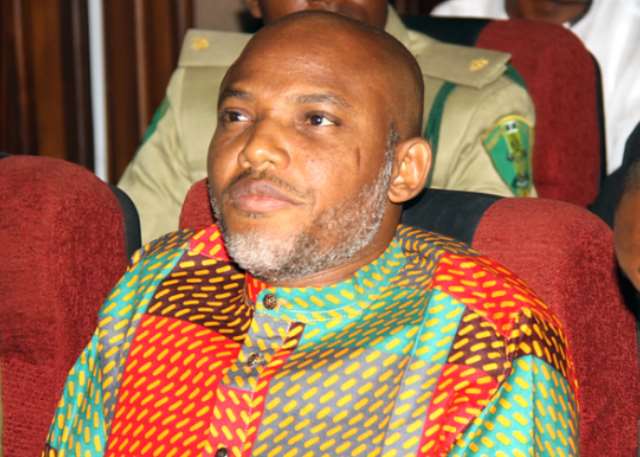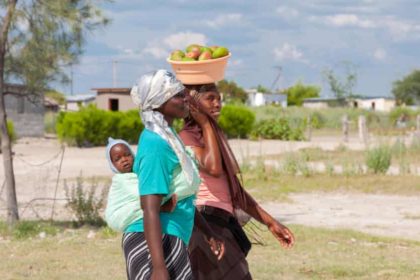The ongoing trial of Nnamdi Kanu, leader of the Indigenous People of Biafra (IPOB), has hit another impasse following the withdrawal of Justice Binta Nyako from the case and the lack of a new judge assigned to oversee the proceedings. This legal deadlock has raised concerns about judicial accountability and the implications for the rule of law in Nigeria.
Aloy Ejimakor, Special Counsel to Kanu, announced that no trial activities would resume until Chief Judge of the Federal High Court, Justice John Tsoho, formally assigns the case to a new judge. Speaking on behalf of the embattled IPOB leader, Ejimakor underscored the unconstitutionality of Kanu’s prolonged detention without trial amidst what he described as judicial dithering.
The latest delay stems from Justice Nyako’s formal withdrawal from Kanu’s case, a move she solidified with an official court order confirming her recusal. Her decision to step down follows a formal request from Kanu in September 2024, where he raised concerns over perceived impartiality in her handling of the case.
While Justice Nyako’s recusal initially promised to steer the trial toward a fresh start under new judicial oversight, subsequent developments have created a legal vacuum. Chief Judge Tsoho, tasked with reassigning the case, unexpectedly returned the case file to Justice Nyako, instructing her to proceed with the trial.
This back-and-forth between the judiciary has further complicated Kanu’s trial, which has already drawn both national and international scrutiny. Federal Government counsel Adegboyega Awomolo had requested a new trial date in line with Tsoho’s directive, but Ejimakor swiftly rejected this move, deeming it a blatant disregard of Justice Nyako’s binding recusal order.
“The recusal order remains valid and must be respected,” Ejimakor stated. “Justice Nyako has withdrawn from the case, and no legal proceedings can resume until another judge is assigned.”
Ejimakor’s firm stance raises critical questions about judicial independence and the procedural integrity of Kanu’s ongoing trial. Any attempt to resume proceedings under Justice Nyako, he warned, would not only violate her recusal order but could trigger further legal and constitutional complications.
At the core of the stalemate lies the issue of Kanu’s prolonged detention. Despite repeated calls for judicial expediency, Kanu remains in custody without a trial date in sight. Ejimakor has described the situation as a gross violation of Kanu’s constitutional rights.
“The Nigerian Constitution forbids detaining an individual without trial for an unreasonable period,” Ejimakor asserted. “This delay is not Kanu’s fault but a direct consequence of the authorities’ inability to handle the case properly.”
He added that Kanu’s indefinite detention without trial undermines the principles of justice and equity, pointing to the lack of judicial urgency in a case of such high public interest.
Ejimakor likened the current judicial predicament to a “legal Egypt,” a reference to hardship and stagnation. According to him, Kanu is unwilling to participate in further proceedings if they circumvent proper legal channels.
“Kanu is resolute; he will not return to a system where his fundamental rights are trampled upon,” Ejimakor said.
With mounting pressure on the judiciary, the outcome of this judicial impasse is likely to have far-reaching implications for Kanu’s trial, the credibility of Nigeria’s legal system, and the broader issue of human rights in the country.
The continued delays in Kanu’s case have already drawn widespread attention. Domestically, the trial has become a lightning rod for debates on legal fairness, due process, and the treatment of individuals perceived to be political prisoners. Internationally, human rights organizations and foreign governments continue to monitor the case closely, underscoring its potential impact on Nigeria’s international standing.
The Federal High Court Chief Judge Tsoho, now faces significant pressure to resolve this judicial quagmire by assigning Kanu’s case to a judge capable of ensuring a fair trial. Meanwhile, the public and legal observers await clarity on how the judiciary will address this growing controversy.
While Justice Nyako’s withdrawal initially seemed to pave the way for progress in a trial plagued by delays, the lack of reassignment has plunged the case into uncertainty.
Kanu’s counsel insists that due process must be followed. As the legal deadlock persists, the stakes continue to rise, with implications for justice, the rule of law, and public trust in Nigeria’s judiciary hanging in the balance.




